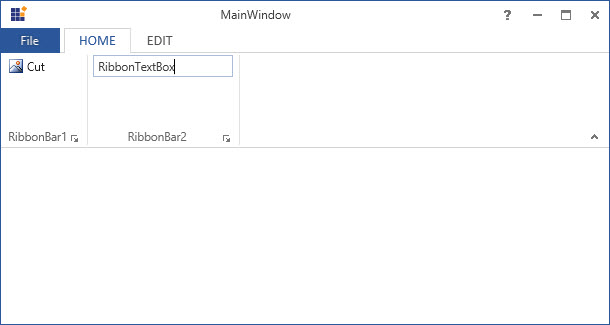How can I help you?
RibbonTextBox in WPF Ribbon
18 Feb 20255 minutes to read
RibbonTextBox control provide similar set of functionalities like normal TextBox control in Ribbon Instance.
Add TextBox to the RibbonBar
<syncfusion:Ribbon Name="_ribbon" HorizontalAlignment="Stretch" VerticalAlignment="Top">
<syncfusion:RibbonTab Name="_ribbonTab1" Caption="HOME" IsChecked="True">
<syncfusion:RibbonBar Name="_ribbonBar2" Header="RibbonBar1">
<syncfusion:RibbonButton Label="Cut"/>
</syncfusion:RibbonBar>
<syncfusion:RibbonBar Name="_ribbonBar2" Width="150" Header="RibbonBar2">
<syncfusion:RibbonTextBox Width="140" Text="RibbonTextBox"></syncfusion:RibbonTextBox>
</syncfusion:RibbonBar>
</syncfusion:RibbonTab>
<syncfusion:RibbonTab Caption="EDIT" IsChecked="False"/>
</syncfusion:Ribbon>Create instance of RibbonTextBox and add it to RibbonBar through code behind.
RibbonTextBox _ribbonTextBox = new RibbonTextBox(){Text = "RibbonTextBox"};
_ribbonBar2.Items.Add(_ribbonTextBox);Dim _ribbonTextBox As New RibbonTextBox() With {.Text = "RibbonTextBox"}
_ribbonBar2.Items.Add(_ribbonTextBox)
Add TextBox to the simplified layout
When the simplified layout is enabled, the RibbonTextBox can be added and displayed in a single line as shown below. To know more about the simplified layout, refer here.
<syncfusion:RibbonWindow x:Class="RibbonButton_IconTemp.Window1"
xmlns="http://schemas.microsoft.com/winfx/2006/xaml/presentation"
xmlns:x="http://schemas.microsoft.com/winfx/2006/xaml"
xmlns:d="http://schemas.microsoft.com/expression/blend/2008"
xmlns:mc="http://schemas.openxmlformats.org/markup-compatibility/2006"
xmlns:local="clr-namespace:RibbonButton_IconTemp" xmlns:skin="clr-namespace:Syncfusion.SfSkinManager;assembly=Syncfusion.SfSkinManager.WPF"
mc:Ignorable="d" xmlns:syncfusion="http://schemas.syncfusion.com/wpf"
skin:SfSkinManager.VisualStyle="MaterialLight"
Title="Untitled 1 - Ribbon Control" Height="450" Width="800">
<Grid x:Name="grid">
<syncfusion:Ribbon VerticalAlignment="Top" EnableSimplifiedLayoutMode="True" LayoutMode="Simplified">
<syncfusion:RibbonTab Caption="HOME" IsChecked="True">
<syncfusion:RibbonBar Header="Font">
<syncfusion:RibbonTextBox Width="140" Text="RibbonTextBox"></syncfusion:RibbonTextBox>
</syncfusion:RibbonBar>
</syncfusion:RibbonTab>
</syncfusion:Ribbon>
</Grid>
</syncfusion:RibbonWindow>Ribbon ribbon = new Ribbon();
ribbon.VerticalAlignment = VerticalAlignment.Top;
ribbon.EnableSimplifiedLayoutMode = true;
ribbon.LayoutMode = LayoutMode.Simplified;
// Creating new tabs
RibbonTab homeTab = new RibbonTab();
homeTab.Caption = "Home";
homeTab.IsChecked = true;
// Creating new bar
RibbonBar fontBar = new RibbonBar();
fontBar.Header = "Font";
// Creating items
RibbonTextBox ribbonTextBox = new RibbonTextBox() { Text = "RibbonTextBox" };
// Adding items to bar
fontBar.Items.Add(ribbonTextBox);
// Adding bars to the tabs
homeTab.Items.Add(fontBar);
// Adding tabs to ribbon
ribbon.Items.Add(homeTab);
grid.Children.Add(ribbon);
SfSkinManager.SetVisualStyle(this, VisualStyles.MaterialLight);
When arranging in simplified layout alone, the Margin, Width and Height values of the RibbonTextBox can be ignored as it will be resized automatically to the standard width and height. If the RibbonTextBox is to be shown in both normal and simplified layout, the Margin, Width and Height properties can be set for normal layout alone using triggers.
<syncfusion:RibbonTextBox Text="Enter text" syncfusion:SimplifiedLayoutSettings.DisplayMode="Normal,Simplified" >
<syncfusion:RibbonTextBox.Style>
<Style TargetType="syncfusion:RibbonTextBox" BasedOn="{StaticResource SyncfusionRibbonTextBoxStyle}">
<Style.Triggers>
<Trigger Property="syncfusion:SimplifiedLayoutSettings.LayoutMode" Value="Normal">
<Setter Property="Height" Value="25"/>
<Setter Property="Width" Value="48"/>
<Setter Property="Margin" Value="2"/>
</Trigger>
</Style.Triggers>
</Style>
</syncfusion:RibbonTextBox.Style>
</syncfusion:RibbonTextBox >